JAVA LAB 8 ARRAY BASED LISTS The next exercise is based on
JAVA
LAB #8 - ARRAY BASED LISTS
The next exercise is based on this implemetation for an UnorderedArrayList of integers:
//Interface: ArrayListADT
//works for int
public interface ArrayListADT {
public boolean isEmpty(); //Method to determine whether the list is empty.
public boolean isFull(); //Method to determine whether the list is full.
public int listSize(); //Method to return the number of elements in the list.
public int maxListSize(); //Method to return the maximum size of the list.
public void print(); //Method to output the elements of the list.
public boolean isItemAtEqual(int location, int item); //Method to determine whether item is the same as the item in the list at location.
public void insertAt(int location, int insertItem); //Method to insert insertItem in the list at the position
public void insertEnd(int insertItem); //Method to insert insertItem at the end of the list.
public void removeAt(int location); //Method to remove the item from the list at location.
public int retrieveAt(int location); //Method to retrieve the element from the list at location.
public void replaceAt(int location, int repItem); //Method to replace the element in the list at location with repItem.
public void clearList(); //Method to remove all the elements from the list.
public int search(int searchItem); //Method to determine whether searchItem is in the list.
public void remove(int removeItem); //Method to remove an item from the list.
}
//Class: ArrayListClass implements
//Interface: ArrayListADT
public abstract class ArrayListClass implements ArrayListADT {
protected int length; //to store the length of the list
protected int maxSize; //to store the maximum size of the list
protected int[] list; //array to hold the list elements
//Default constructor
public ArrayListClass() {
maxSize = 100;
length = 0;
list = new int[maxSize];
}
//Alternate Constructor
public ArrayListClass(int size) {
if(size <= 0) {
System.err.println(\"The array size must be positive. Creating an array of size 100.\");
maxSize = 100;
}
else
maxSize = size;
length = 0;
list = new int[maxSize];
}
public boolean isEmpty() {
return (length == 0);
}
public boolean isFull() {
return (length == maxSize);
}
public int listSize() {
return length;
}
public int maxListSize() {
return maxSize;
}
public void print() {
for (int i = 0; i < length; i++)
System.out.print(list[i] + \" \");
System.out.println();
}
public boolean isItemAtEqual(int location, int item) {
if (location < 0 || location >= length) {
System.err.println(\"The location of the item to be compared is out of range.\");
return false;
}
return list[location]== item;
}
public void clearList() {
for (int i = 0; i < length; i++)
list[i] = 0;
length = 0;
System.gc(); //invoke the Java garbage collector
}
public void removeAt(int location) {
if (location < 0 || location >= length)
System.err.println(\"The location of the item to be removed is out of range.\");
else {
for(int i = location; i < length - 1; i++)
list[i] = list[i + 1];
length--;
}
}
public int retrieveAt(int location) {
if (location < 0 || location >= length) {
System.err.println(\"The location of the item to be retrieved is out of range.\");
return 0;
}
else
return list[location];
}
public abstract void insertAt(int location, int insertItem);
public abstract void insertEnd(int insertItem);
public abstract void replaceAt(int location, int repItem);
public abstract int search(int searchItem);
public abstract void remove(int removeItem);
}
//Class: UnorderedArrayList extends
//Super class: ArrayListClass
public class UnorderedArrayList extends ArrayListClass {
public UnorderedArrayList() {
super();
}
public UnorderedArrayList(int size) {
super(size);
}
//Bubble Sort
public void bubbleSort() {
for (int pass = 0; pass < length - 1; pass++) {
for (int i = 0; i < length - 1; i++) {
if (list[i] > list[i + 1]) {
int temp = list[i];
list[i] = list[i + 1];
list[i + 1] = temp;
}
}
}
}
//implementation for abstract methods defined in ArrayListClass
//unordered list --> linear search
public int search(int searchItem) {
for(int i = 0; i < length; i++)
if(list[i] == searchItem)
return i;
return -1;
}
public void insertAt(int location, int insertItem) {
if (location < 0 || location >= maxSize)
System.err.println(\"The position of the item to be inserted is out of range.\");
else if (length >= maxSize)
System.err.println(\"Cannot insert in a full list.\");
else {
for (int i = length; i > location; i--)
list[i] = list[i - 1]; //shift right
list[location] = insertItem;
length++;
}
}
public void insertEnd(int insertItem) {
if (length >= maxSize)
System.err.println(\"Cannot insert in a full list.\");
else {
list[length] = insertItem;
length++;
}
}
public void replaceAt(int location, int repItem) {
if (location < 0 || location >= length)
System.err.println(\"The location of the item to be replaced is out of range.\");
else
list[location] = repItem;
}
public void remove(int removeItem) {
int i;
if (length == 0)
System.err.println(\"Cannot delete from an empty list.\");
else {
i = search(removeItem);
if (i != -1)
removeAt(i);
else
System.out.println(\"Cannot delete! The item to be deleted is not in the list.\");
}
}
}
Add to class UnorderedArrayList a new method called scaleByK that should replace every integer of value k with k copies of itself. For example, if the list is: [2, 4, -2, 5, 3, 0, 7] before the method is invoked, it should be [2, 2, 4, 4, 4, 4, 5, 5, 5, 5, 5, 3, 3, 3, 7, 7, 7, 7, 7, 7, 7 ] after the method executes. Note that the method should remove from the list all 0s and negative values. Test the method using this client:
//Testing the method scaleByK added to the user created UnorderedArrayList class
public class Lab8_1 {
public static final int SIZE = 100;
public static void main(String[] args) {
UnorderedArrayList list = new UnorderedArrayList(SIZE);
list.insertEnd(2);
list.insertEnd(4);
list.insertEnd(-2);
list.insertEnd(5);
list.insertEnd(3);
list.insertEnd(0);
list.insertEnd(7);
System.out.println(\"The original list is: \");
list.print();
System.out.println(\"The list after method call is: \");
list.scaleByK();
list.print();
}
}
1.2. Same problem. This time use the ArrayList class in Java. Write scaleByK as a client method and use the print method provided.
//Testing the method scaleByK using the Java ArrayList class
import java.util.ArrayList;
public class Lab8_2 {
public static void main(String[] args) {
ArrayList <Integer> list = new ArrayList <Integer>();
list.add(2);
list.add(4);
list.add(-2);
list.add(5);
list.add(3);
list.add(0);
list.add(7);
System.out.println(\"The original list is: \");
print(list);
System.out.println(\"The list after method call is: \");
scaleByK(list);
print(list);
}
public static void scaleByK(ArrayList<Integer> list) {
...
}
public static void print(ArrayList< Integer> someList) {
for(Integer i:someList)
System.out.print(i + \" \");
System.out.println();
}
}
The next exercise is based on this implemetation for an OrderedArrayList of integers:
//Interface: ArrayListADT
public interface ArrayListADT {
//same as above, you already have it!
}
//Class: ArrayListClass implements
//Interface: ArrayListADT
public abstract class ArrayListClass implements ArrayListADT {
//same as above, you already have it!
}
//Class: OrderedArrayList extends
//Super class: ArrayListClass
public class OrderedArrayList extends ArrayListClass{
public OrderedArrayList() {
super();
}
public OrderedArrayList(int size) {
super(size);
}
//implementation for abstract methods defined in ArrayListClass
//ordered list --> binary search
public int search(int item) {
int first = 0;
int last = length - 1;
int middle = -1;
while (first <= last) {
middle = (first + last) / 2;
if (list[middle] == item)
return middle;
else
if (list[middle] > item)
last = middle - 1;
else
first = middle + 1;
}
return -1;
}
public void insert(int item) {
int loc;
boolean found = false;
if (length == 0) //list is empty
list[length++] = item; //insert item and increment length
else if (length == maxSize) //list is full
System.err.println(\"Cannot insert in a full list.\");
else {
for (loc = 0; loc <length; loc++) {
if (list[loc] >= item) {
found = true;
break;
}
}
//starting at the end, shift right
for (int i = length; i > loc; i--)
list[i] = list[i - 1];
list[loc] = item; //insert in place
length++;
}
}
/* Another version for insert:
public void insert(int item) {
int loc;
boolean found = false;
if (length == 0) //list is empty
list[length++] = item; //insert item and increment length
else if (length == maxSize) //list is full
System.err.println(\"Cannot insert in a full list.\");
else {
int i = length - 1;
while (i >= 0 && list[i]> item) {
list[i + 1] = list[i];
i--;
}
list[i + 1] = item; // Insert item
length++;
}
} */
public void insertAt(int location, int item) {
if (location < 0 || location >= maxSize)
System.err.println(\"The position of the item to be inserted is out of range.\");
else if (length == maxSize) //the list is full
System.err.println(\"Cannot insert in a full list.\");
else {
System.out.println(\"Cannot do it, this is a sorted list. Doing insert in place (call to insert).\");
insert(item);
}
}
public void insertEnd(int item) {
if (length == maxSize) //the list is full
System.err.println(\"Cannot insert in a full list.\");
else {
System.out.println(\"Cannot do it, this is a sorted list. Doing insert in place (call to insert).\");
insert(item);
}
}
public void replaceAt(int location, int item) {
//the list is sorted!
//is actually removing the element at location and inserting item in place
if (location < 0 || location >= length)
System.err.println(\"The position of the item to be replaced is out of range.\");
else {
removeAt(location);//method in ArrayListClass
insert(item);
}
}
public void remove(int item) {
int loc;
if (length == 0)
System.err.println(\"Cannot delete from an empty list.\");
else {
loc = search(item);
if (loc != -1)
removeAt(loc);//method in ArrayListClass
else
System.out.println(\"The item to be deleted is not in the list.\");
}
}
/*Another version for remove:
public void remove(T item) {
int loc;
if (length == 0)
System.err.println(\"Cannot delete from an empty list.\");
else {
loc = search(item);
if (loc != -1) {
for(int i = loc; i < length - 1; i++)
list[i] = list[i + 1]; //shift left
length--;
}
else
System.out.println(\"The item to be deleted is not in the list.\");
}
} */
}
2.1. Add to class OrderedArrayList a new method called removeDuplicates that should eliminate any duplicates from a sorted list. For example, if the list is: [2, 2, 2, 2, 5, 5, 8, 9, 9, 9 ] before the method is invoked, it should be [2, 5, 8, 9 ] after the method executes. Test the method using this client:
//Testing the method removeDuplicates added to the user created OrderedArrayList class
public class Lab8_3 {
public static void main(String[] args) {
OrderedArrayList list = new OrderedArrayList();
list.insert(8);
list.insert(2);
list.insert(2);
list.insert(9);
list.insert(5);
list.insert(9);
list.insert(2);
list.insert(9);
list.insert(2);
list.insert(5);
System.out.println(\"The original list is: \");
list.print();
System.out.println(\"The list after method call is: \");
list.removeDuplicates();
list.print();
}
}
2.2. Same problem. This time use the ArrayList class in Java. Write removeDuplicates as a client method and use the print method provided.
//Testing the method removeDuplicates using the Java ArrayList class
import java.util.ArrayList;
public class Lab8_4 {
public static void main(String[] args) {
ArrayList <Integer> list = new ArrayList< Integer>();
list.add(2);
list.add(2);
list.add(2);
list.add(5);
list.add(5);
list.add(8);
list.add(9);
list.add(9);
System.out.println(\"The original list is: \");
print(list);
System.out.println(\"The list after method call is: \");
removeDuplicates(list);
print(list);
}
public static void removeDuplicates(ArrayList<Integer> list) {
...
}
public static void print(ArrayList< Integer> someList) {
for(Integer i:someList)
System.out.print(i + \" \");
System.out.println();
}
· (modified) UnorderedArrayList class including the method scaleByK
· (modified) OrderedArrayList class including the method removeDuplicates
· Lab8_2 and Lab8_4 programs using the Java ArrayList class
Solution
//here is the java file which contains required method and all other file is same as in question
/***************************** Unordered List ************************************/
import java.util.ArrayList;
import java.util.List;
public class UnorderedArrayList extends ArrayListClass {
public UnorderedArrayList() {
super();
}
public UnorderedArrayList(int size) {
super(size);
}
//Bubble Sort
public void bubbleSort() {
for (int pass = 0; pass < length - 1; pass++) {
for (int i = 0; i < length - 1; i++) {
if (list[i] > list[i + 1]) {
int temp = list[i];
list[i] = list[i + 1];
list[i + 1] = temp;
}
}
}
}
//implementation for abstract methods defined in ArrayListClass
//unordered list --> linear search
public int search(int searchItem) {
for(int i = 0; i < length; i++)
if(list[i] == searchItem)
return i;
return -1;
}
public void insertAt(int location, int insertItem) {
if (location < 0 || location >= maxSize)
System.err.println(\"The position of the item to be inserted is out of range.\");
else if (length >= maxSize)
System.err.println(\"Cannot insert in a full list.\");
else {
for (int i = length; i > location; i--)
list[i] = list[i - 1]; //shift right
list[location] = insertItem;
length++;
}
}
public void insertEnd(int insertItem) {
if (length >= maxSize)
System.err.println(\"Cannot insert in a full list.\");
else {
list[length] = insertItem;
length++;
}
}
public void replaceAt(int location, int repItem) {
if (location < 0 || location >= length)
System.err.println(\"The location of the item to be replaced is out of range.\");
else
list[location] = repItem;
}
public void remove(int removeItem) {
int i;
if (length == 0)
System.err.println(\"Cannot delete from an empty list.\");
else {
i = search(removeItem);
if (i != -1)
removeAt(i);
else
System.out.println(\"Cannot delete! The item to be deleted is not in the list.\");
}
}
public void scaleByK(){
int j=0;
int[] newList = new int[maxSize];;
for(int i = 0; i < length; i++)
{
if(list[i]>0){
for(int k = 0 ; k<list[i] ;k++){
newList[j] = list[i];
j++;
}
}
}
list = newList;
length = j;
}
}
/******************************************* LAB8_2******************************/
import java.util.ArrayList;
import java.util.List;
public class Lab8_2 {
ArrayList <Integer> list = new ArrayList <Integer>();
public static void main(String[] args) {
ArrayList <Integer> list = new ArrayList <Integer>();
list.add(2);
list.add(4);
list.add(-2);
list.add(5);
list.add(3);
list.add(0);
list.add(7);
System.out.println(\"The original list is: \");
print(list);
System.out.println(\"The list after method call is: \");
scaleByK(list);
print(list);
}
public static void scaleByK(ArrayList<Integer> list) {
ArrayList<Integer>newList = new ArrayList<Integer>();
for(int item : list){
if( item>0){
System.out.println(item);
for(int i = 0 ; i<item; i++){
Integer value = new Integer(item);
newList.add(value);
}
}
}
list.removeAll(list);
for(Integer i:newList){
list.add(i);
}
}
public static void print(ArrayList< Integer> someList) {
for(Integer i:someList)
System.out.print(i + \" \");
System.out.println();
}
}
/***********************************Ordered List***************************************/
public class OrderedArrayList extends ArrayListClass{
public OrderedArrayList() {
super();
}
public OrderedArrayList(int size) {
super(size);
}
//implementation for abstract methods defined in ArrayListClass
//ordered list --> binary search
public int search(int item) {
int first = 0;
int last = length - 1;
int middle = -1;
while (first <= last) {
middle = (first + last) / 2;
if (list[middle] == item)
return middle;
else
if (list[middle] > item)
last = middle - 1;
else
first = middle + 1;
}
return -1;
}
public void insert(int item) {
int loc;
boolean found = false;
if (length == 0) //list is empty
list[length++] = item; //insert item and increment length
else if (length == maxSize) //list is full
System.err.println(\"Cannot insert in a full list.\");
else {
for (loc = 0; loc <length; loc++) {
if (list[loc] >= item) {
found = true;
break;
}
}
//starting at the end, shift right
for (int i = length; i > loc; i--)
list[i] = list[i - 1];
list[loc] = item; //insert in place
length++;
}
}
/* Another version for insert:
public void insert(int item) {
int loc;
boolean found = false;
if (length == 0) //list is empty
list[length++] = item; //insert item and increment length
else if (length == maxSize) //list is full
System.err.println(\"Cannot insert in a full list.\");
else {
int i = length - 1;
while (i >= 0 && list[i]> item) {
list[i + 1] = list[i];
i--;
}
list[i + 1] = item; // Insert item
length++;
}
} */
public void insertAt(int location, int item) {
if (location < 0 || location >= maxSize)
System.err.println(\"The position of the item to be inserted is out of range.\");
else if (length == maxSize) //the list is full
System.err.println(\"Cannot insert in a full list.\");
else {
System.out.println(\"Cannot do it, this is a sorted list. Doing insert in place (call to insert).\");
insert(item);
}
}
public void insertEnd(int item) {
if (length == maxSize) //the list is full
System.err.println(\"Cannot insert in a full list.\");
else {
System.out.println(\"Cannot do it, this is a sorted list. Doing insert in place (call to insert).\");
insert(item);
}
}
public void replaceAt(int location, int item) {
//the list is sorted!
//is actually removing the element at location and inserting item in place
if (location < 0 || location >= length)
System.err.println(\"The position of the item to be replaced is out of range.\");
else {
removeAt(location);//method in ArrayListClass
insert(item);
}
}
public void remove(int item) {
int loc;
if (length == 0)
System.err.println(\"Cannot delete from an empty list.\");
else {
loc = search(item);
if (loc != -1)
removeAt(loc);//method in ArrayListClass
else
System.out.println(\"The item to be deleted is not in the list.\");
}
}
/*Another version for remove:
public void remove(T item) {
int loc;
if (length == 0)
System.err.println(\"Cannot delete from an empty list.\");
else {
loc = search(item);
if (loc != -1) {
for(int i = loc; i < length - 1; i++)
list[i] = list[i + 1]; //shift left
length--;
}
else
System.out.println(\"The item to be deleted is not in the list.\");
}
} */
public void removeDuplicates(){
int j,i;
for (i = 0; i < length; i++) {
for (j = i + 1; j < length;) {
if (list[j] == list[i]) {
for (int k = j; k < length; k++) {
list[k] = list[k + 1];
}
length--;
} else
j++;
}
}
}
}
/***************************LAB8_4***********************************/
import java.util.ArrayList;
public class Lab8_4 {
public static void main(String[] args) {
ArrayList <Integer> list = new ArrayList< Integer>();
list.add(2);
list.add(2);
list.add(2);
list.add(5);
list.add(5);
list.add(8);
list.add(9);
list.add(9);
System.out.println(\"The original list is: \");
print(list);
System.out.println(\"The list after method call is: \");
removeDuplicates(list);
print(list);
}
public static void removeDuplicates(ArrayList<Integer> list) {
int count = list.size();
for (int i = 0; i < count; i++)
{
for (int j = i + 1; j < count; j++)
{
if (list.get(i).equals(list.get(j)))
{
list.remove(j--);
count--;
}
}
}
}
public static void print(ArrayList< Integer> someList) {
for(Integer i:someList)
System.out.print(i + \" \");
System.out.println();
}
}
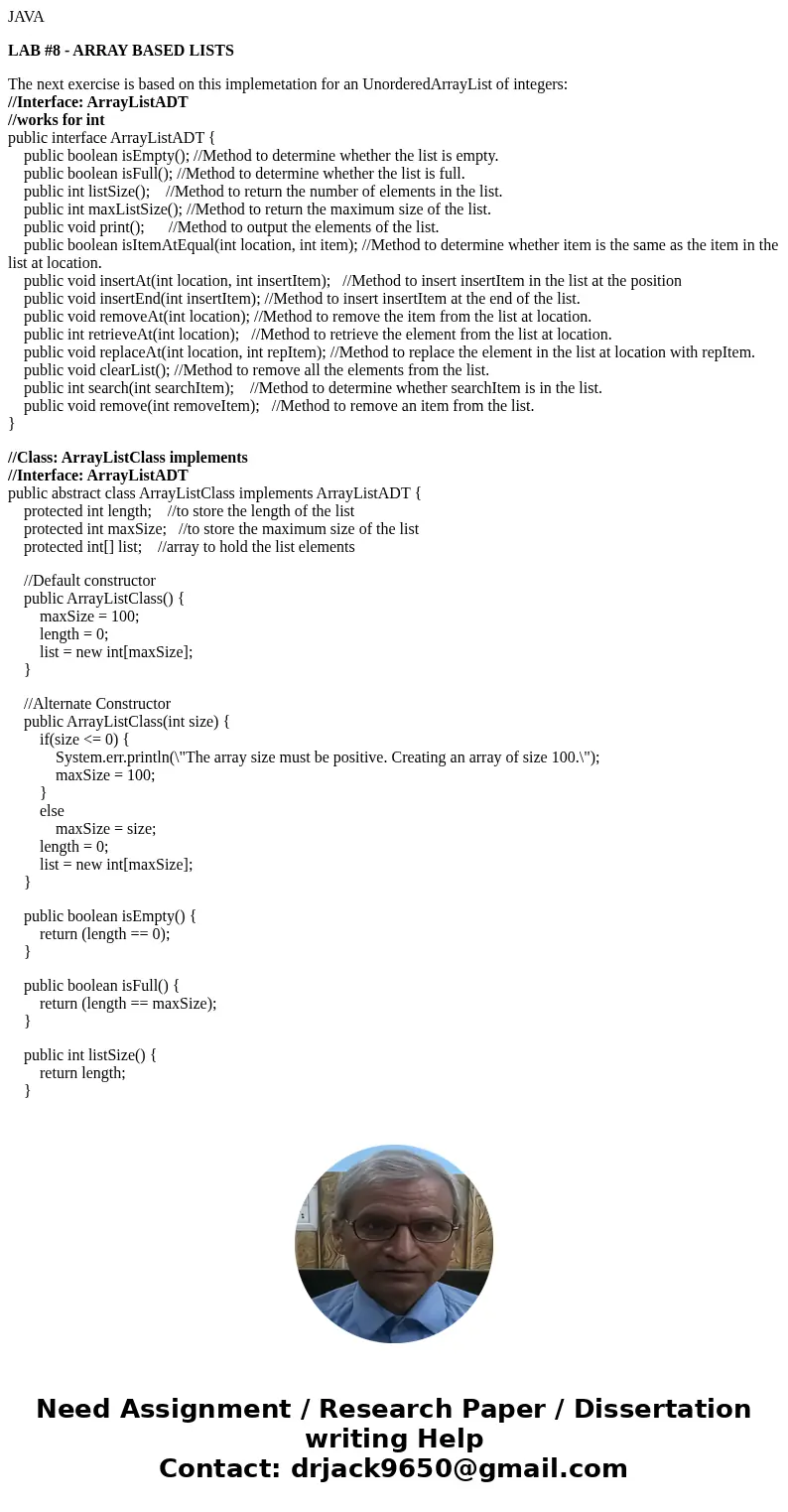
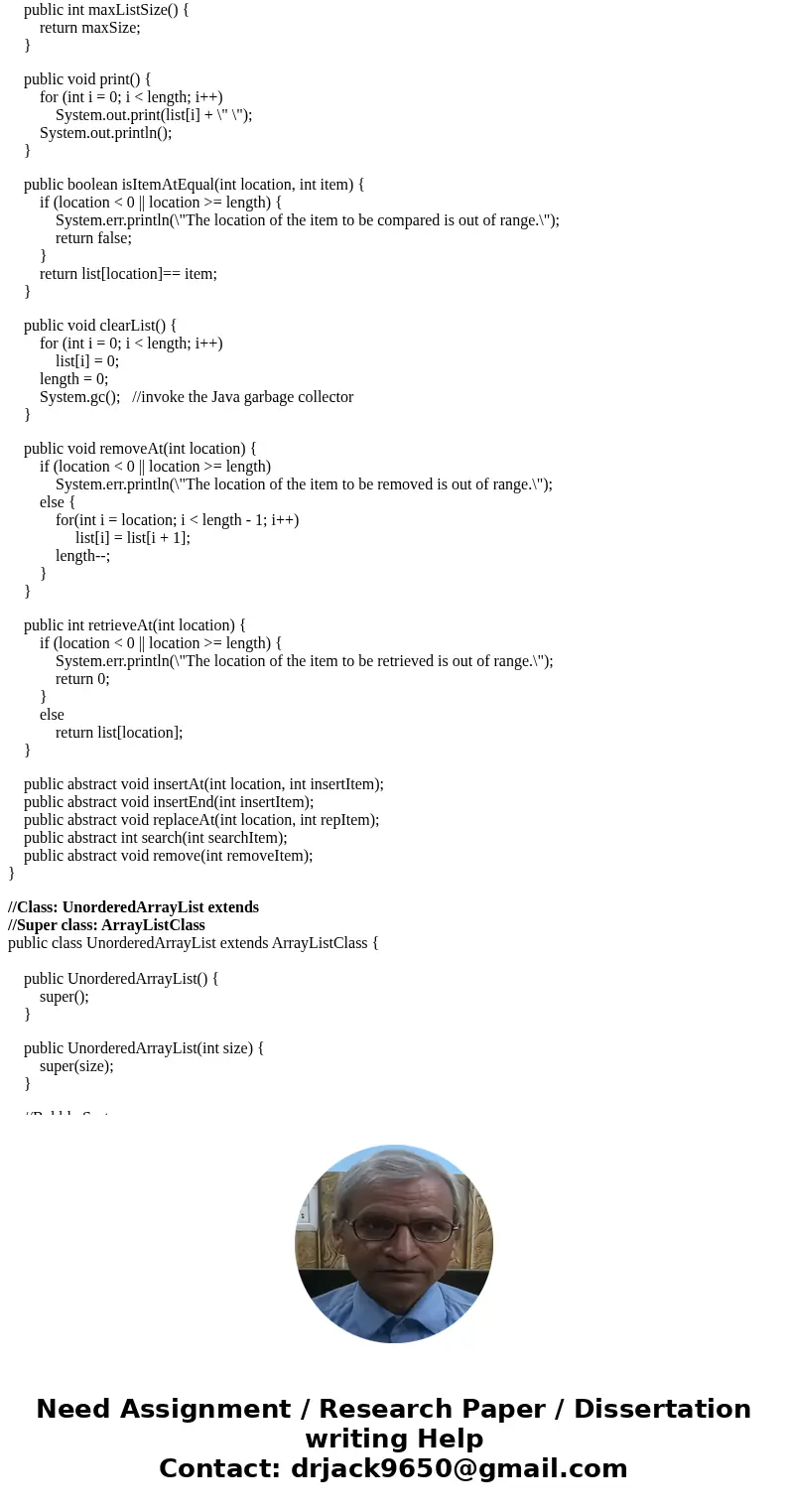
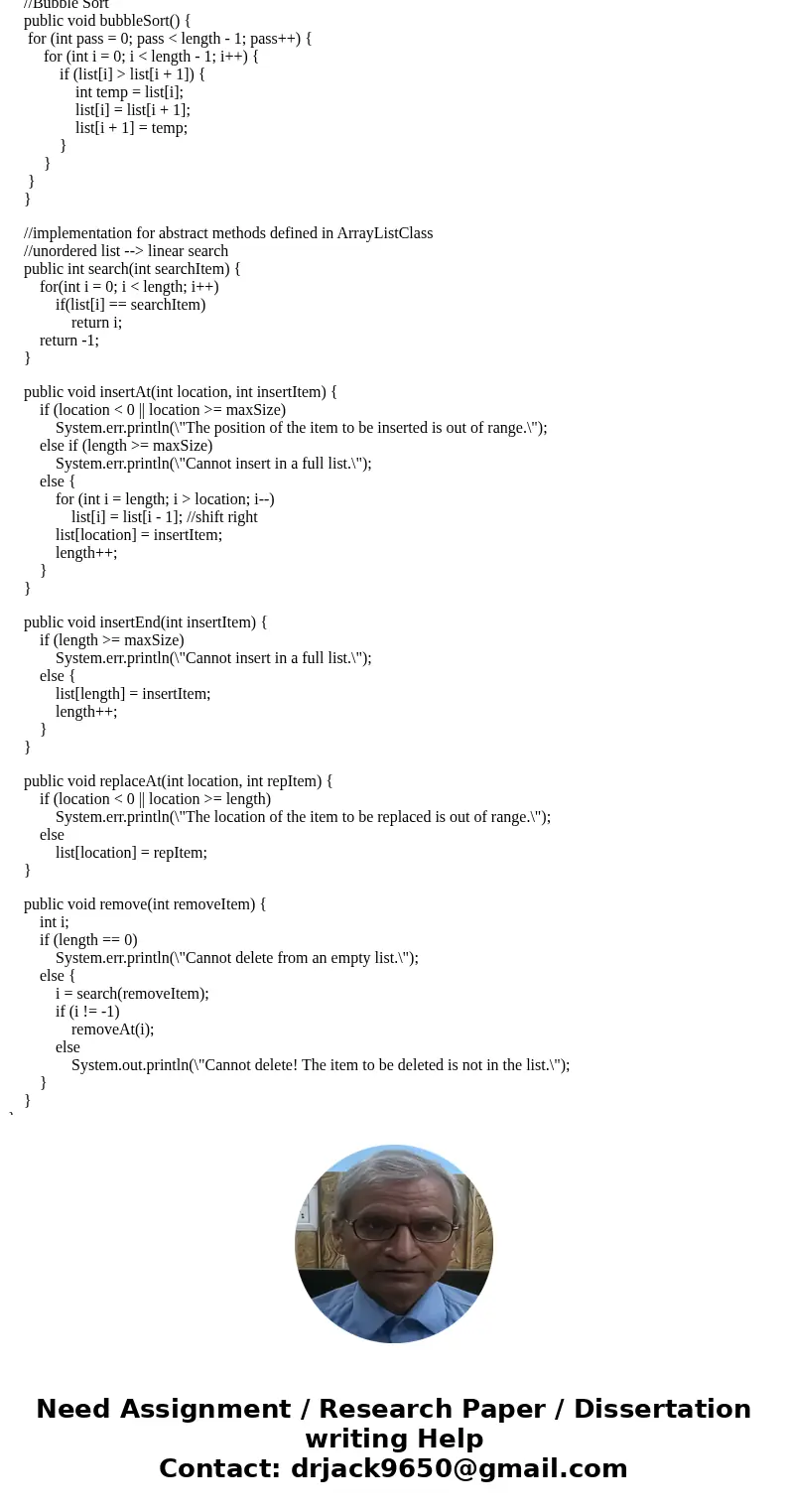
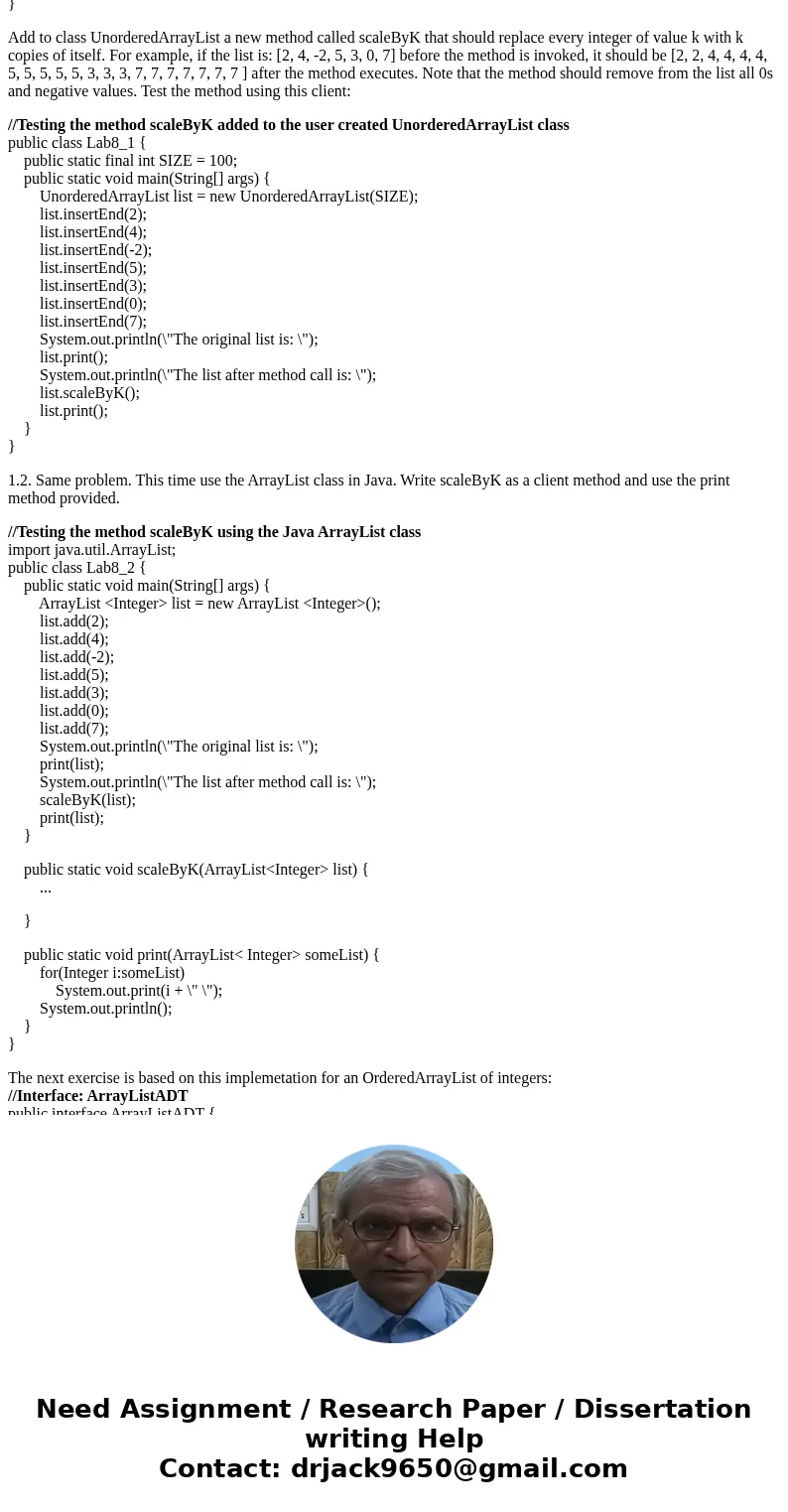
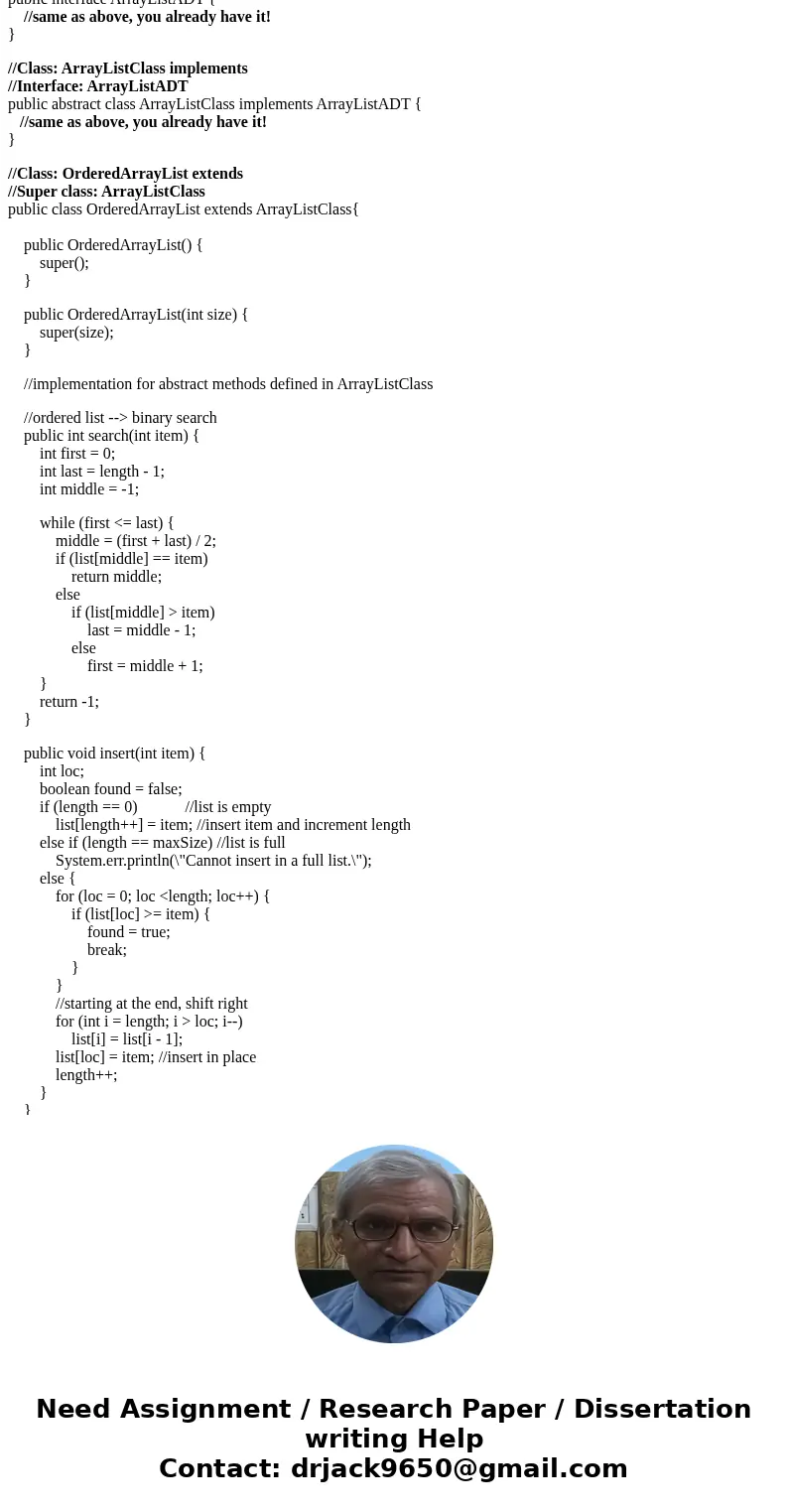
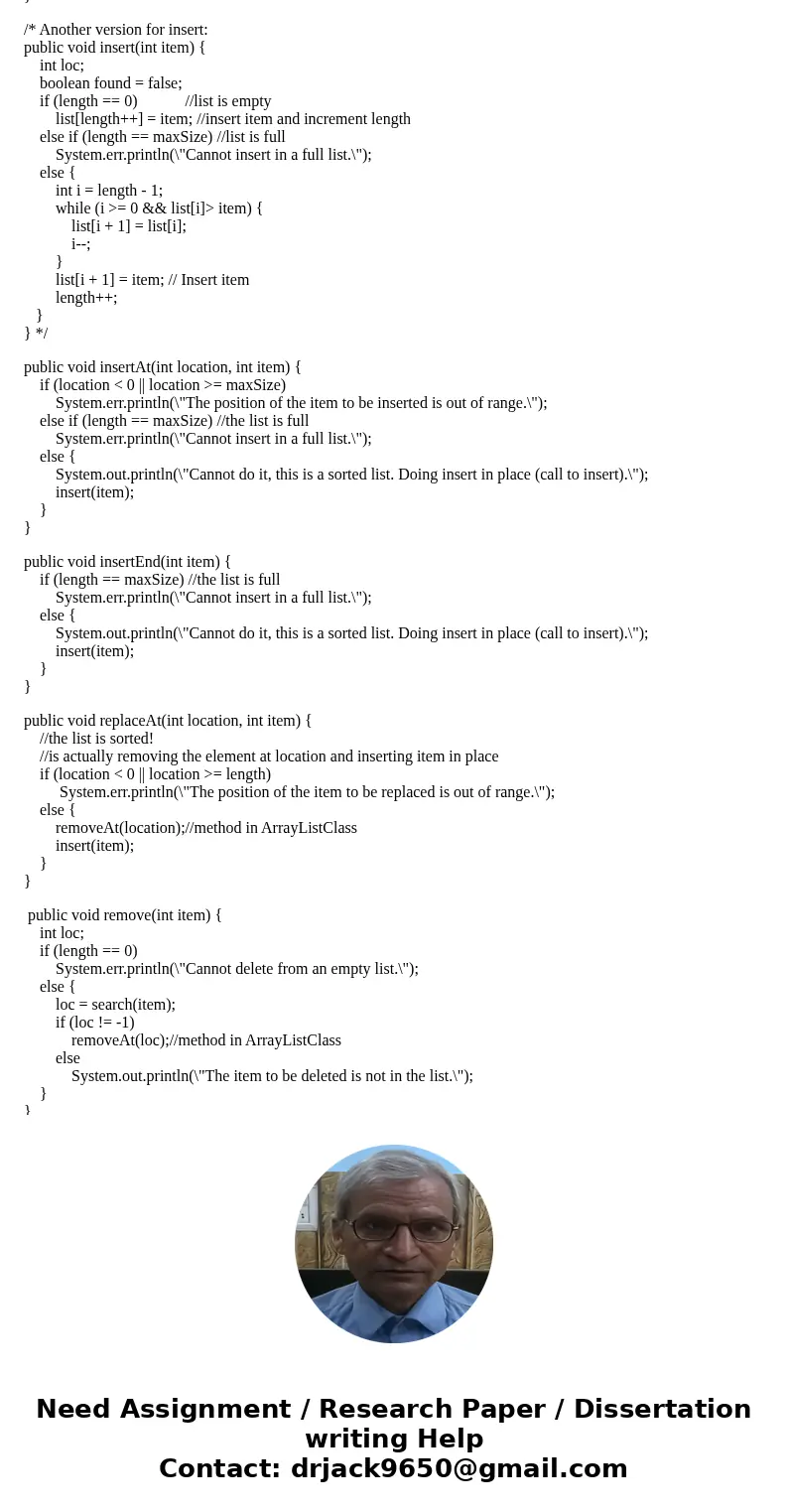
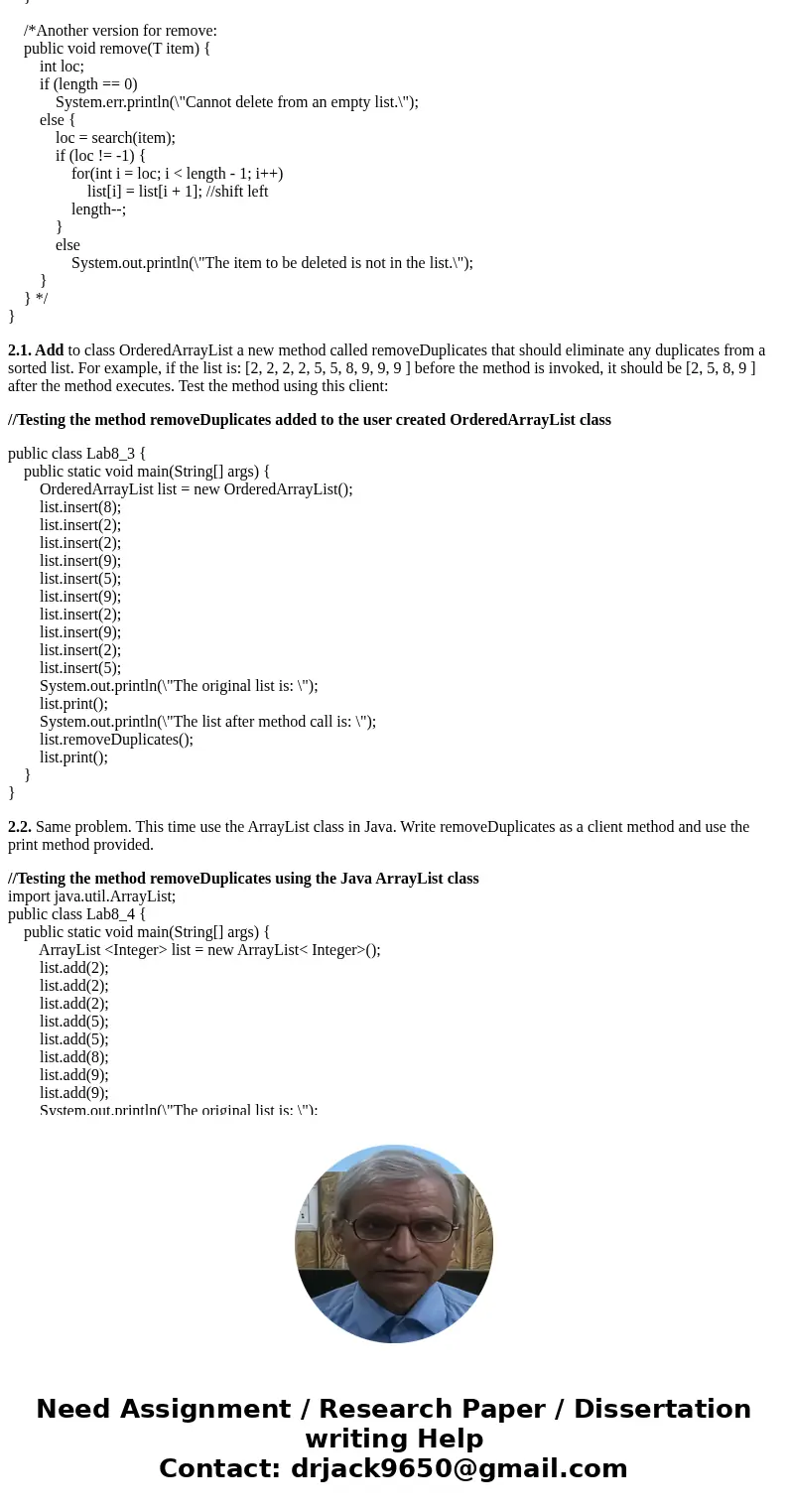
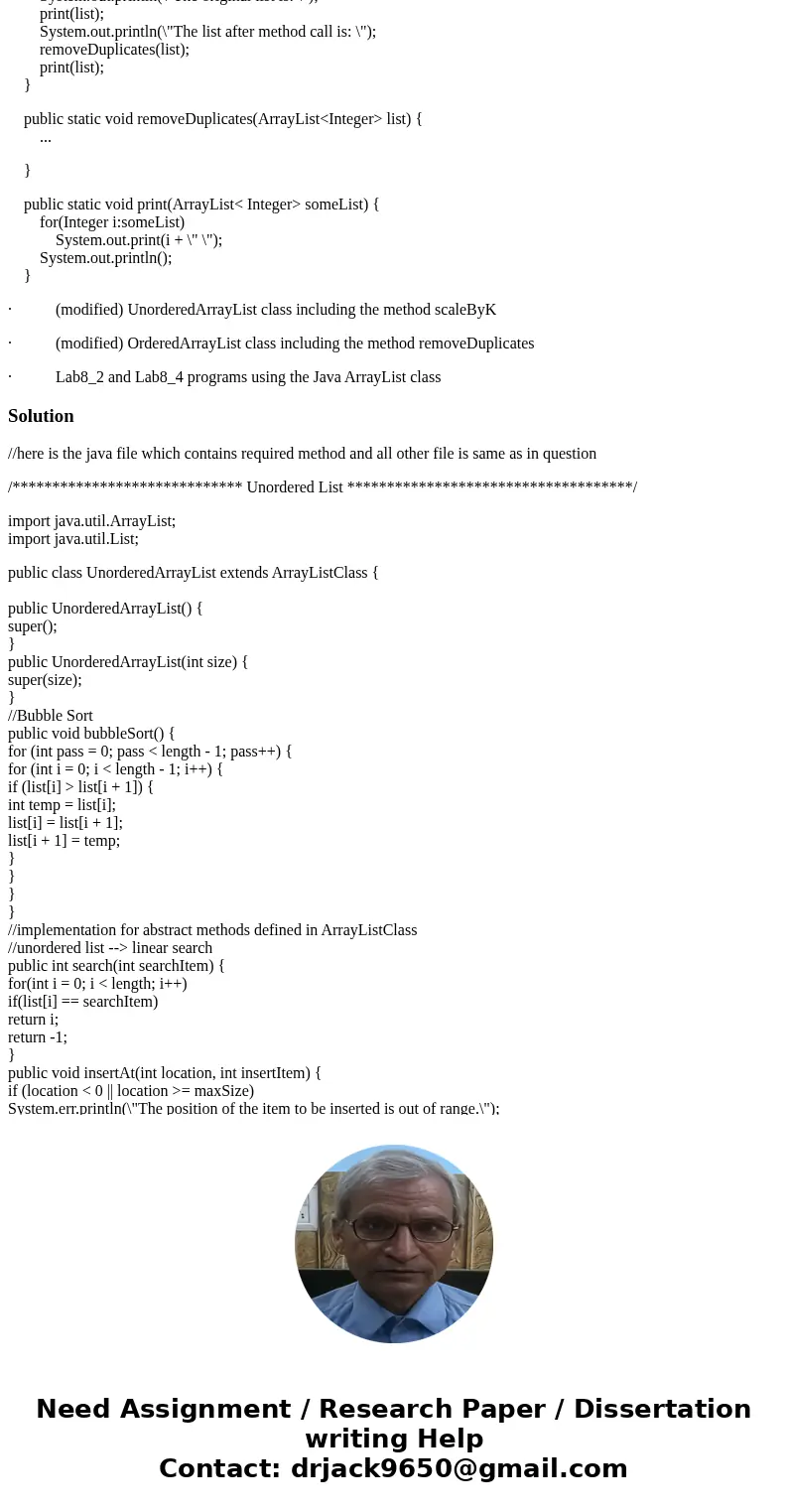
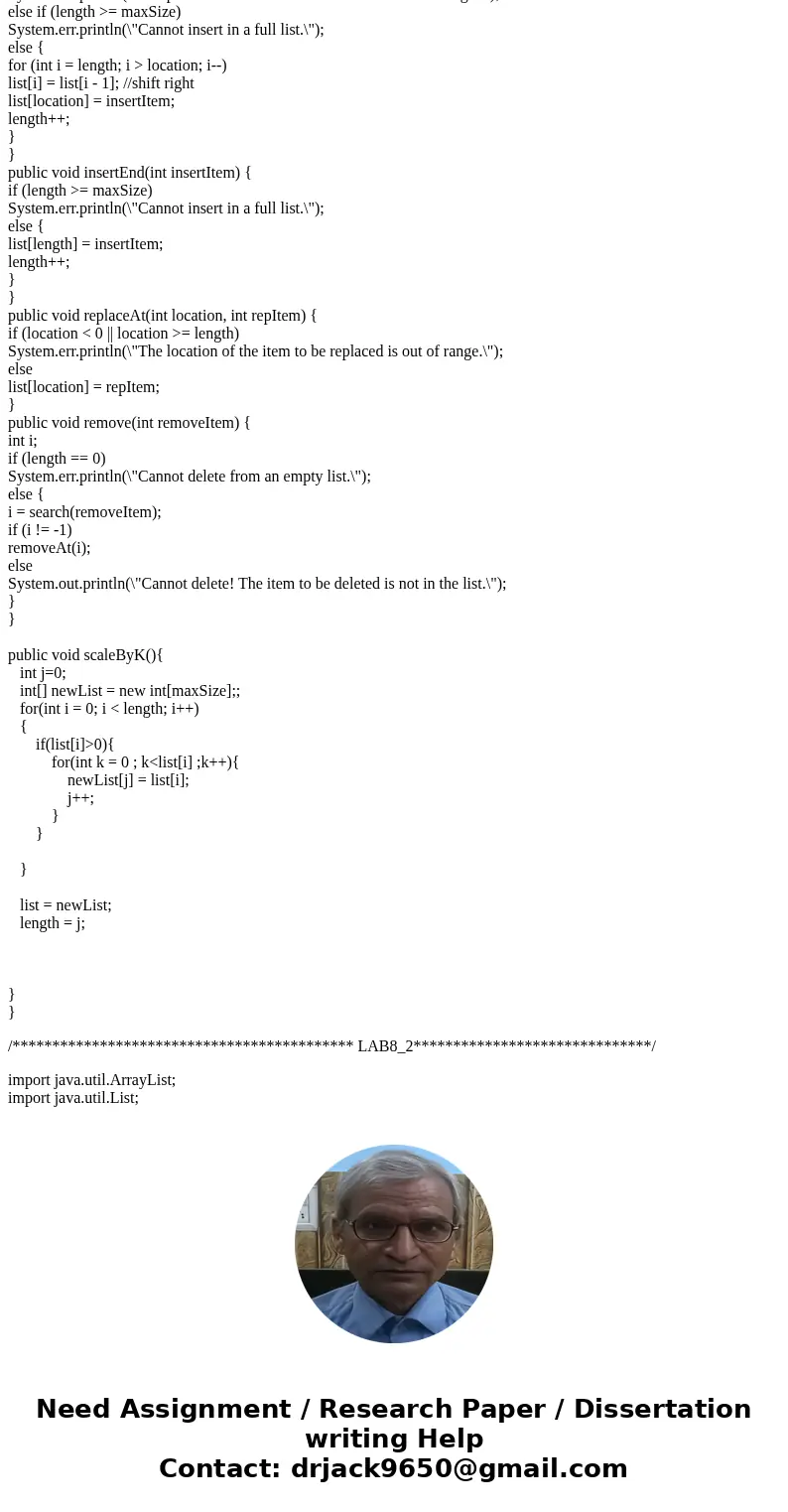
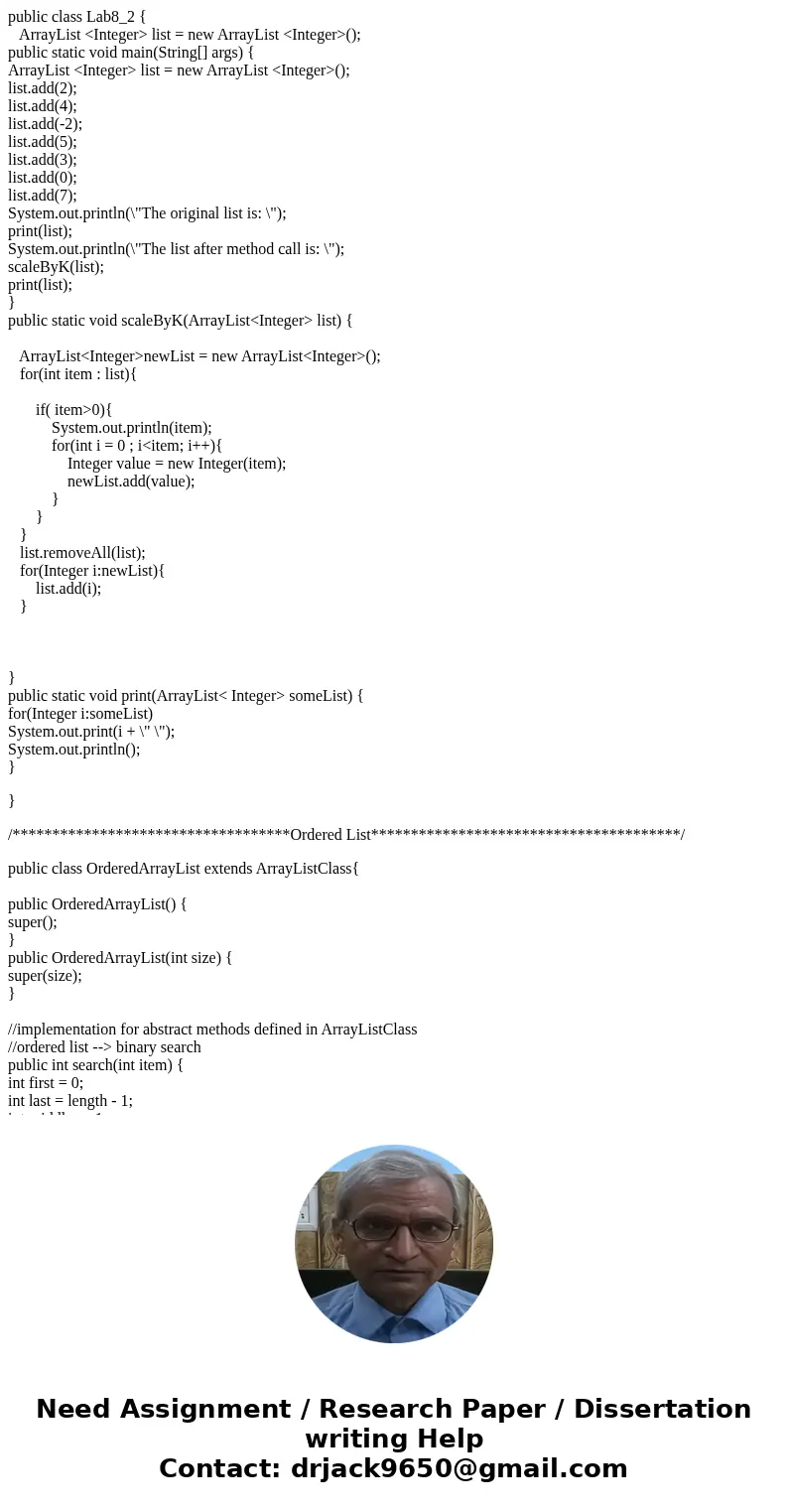
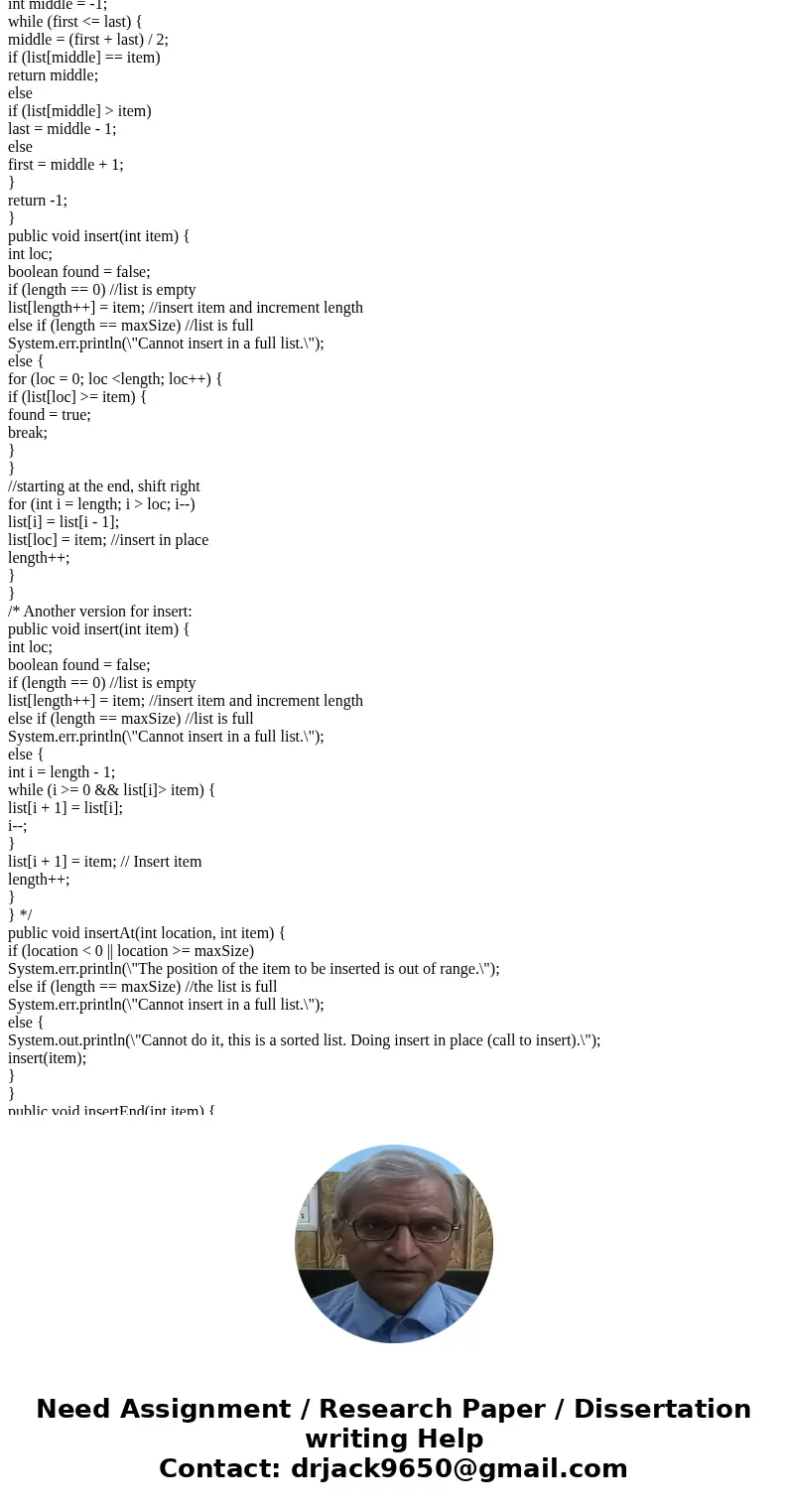
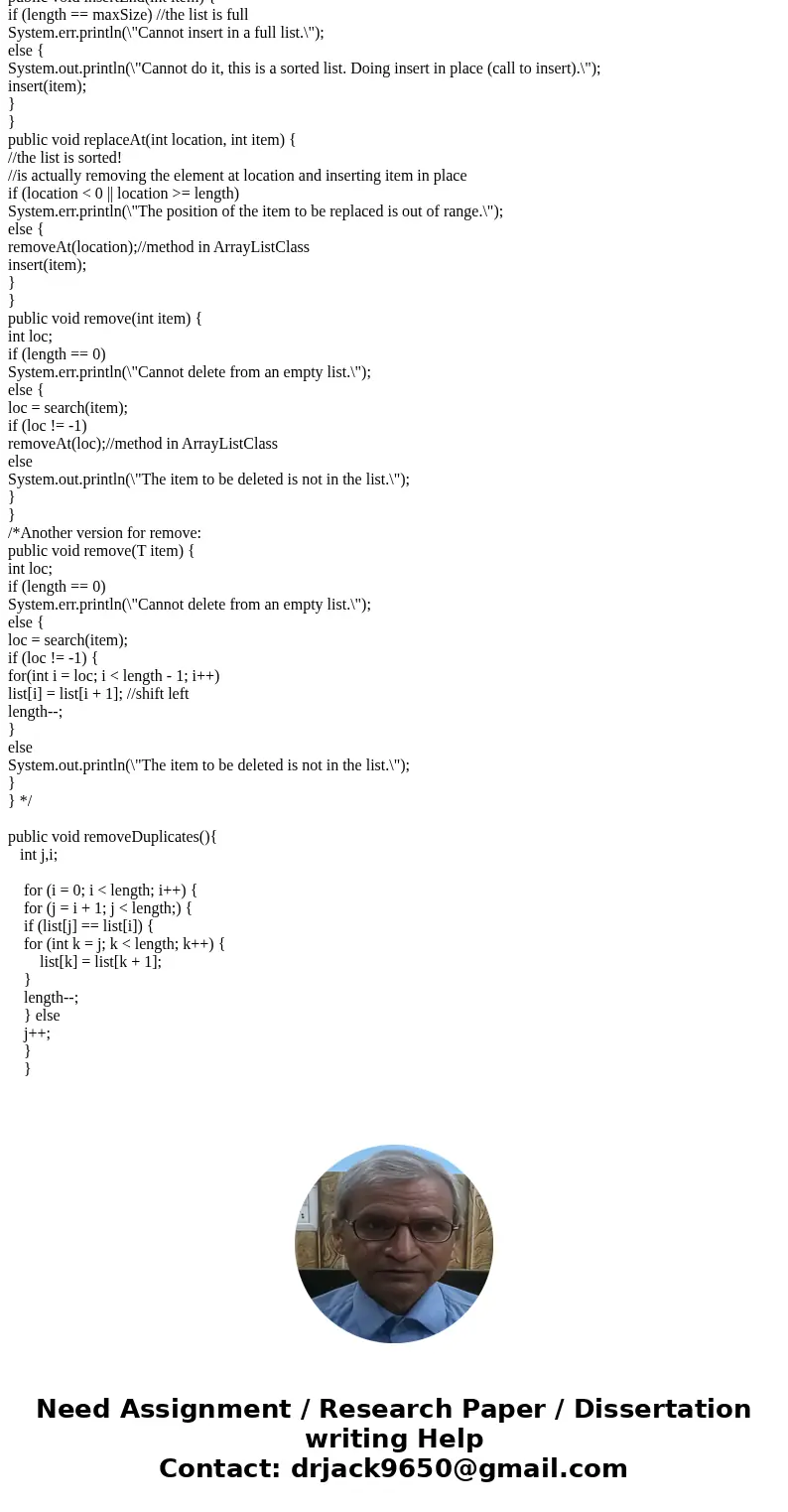
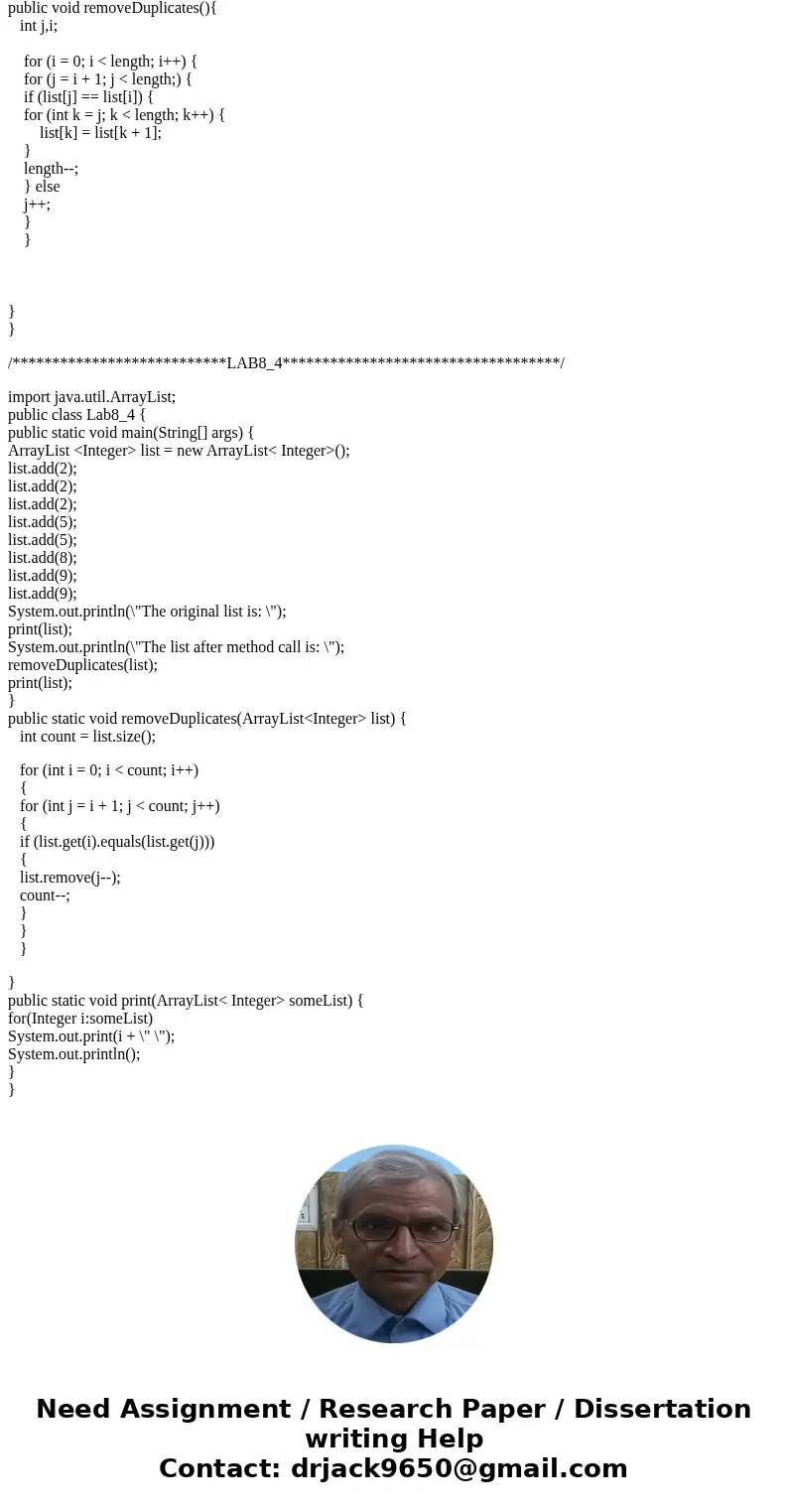
 Homework Sourse
Homework Sourse